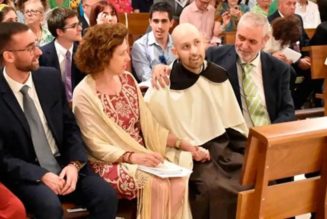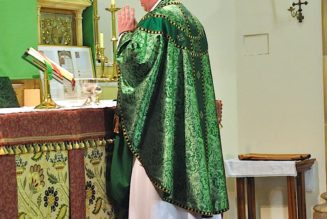Few popes have lived in more perilous times than Pius XI and fewer still have shown as much courage in the midst of peril.
There have been many bad popes throughout the history of the Church. Indeed, there have been so many that it is a miracle that the Church has survived them. On the other hand, of course, and thanks be to God, there have been many more good popes than there have been bad. Many of these have been canonized, an assurance to the faithful that they have joined the company of the saints in the Church Triumphant. Others were good and even great but, for whatever reason, have not been canonized.
In recent times, we might think of Leo XIII, who encouraged and reinvigorated the study of the theology and philosophy of St. Thomas Aquinas, heralding the much-needed neo-Thomistic revival. He also issued Rerum Novarum, the papal encyclical which laid the foundations of the Catholic Church’s social teaching with respect to the twin materialistic evils of Mammon and Marx.
Another pope of recent times who has yet to be canonized is Pius XI. Few popes have lived in more perilous times than Pius XI and fewer still have shown as much courage in the midst of peril. Pius XI’s papacy began in February 1922, eight months before Mussolini’s March on Rome brought the Fascists to power in Italy, and ended in February 1939, seven months before the beginning of World War II. He spent the entirety of his papacy, therefore, in the midst of a Fascist regime which paid little heed to the rights of the Church, riding roughshod over religious liberty in the name of secular fundamentalist ideology.
Nor was Italy the only secular fundamentalist regime with which the pope had to contend. The Communists had risen to power in Russia in 1917, and the Nazis would rise to power in Germany in 1933. Pope Pius XI issued an encyclical condemning atheistic communism and another encyclical condemning the racism, neo-paganism, and “pantheistic confusion” of the Nazis.
Most important, perhaps, was his reiteration of the Church’s social teaching in the encyclical, Quadragesimo Anno, published in 1931 on the fortieth anniversary of the publication of Leo XIII’s Rerum Novarum. These two encyclicals, together with St. John Paul II’s Centesimus Annus, which would be issued in 1991 on the centenary of Leo XIII’s groundbreaking document, indicate all too clearly that the Catholic Church advocates the only just and sustainable alternative to the monopolizing and globalizing power of Big Business and Big Government.
The final act of Pius XI that should be mentioned was his establishment of the liturgical feast of Christ the King in response to the rise of secularist tyranny. In establishing this feast, Pius was reminding the world that every government is under the kingship of Christ, whose power transcends and supersedes any secular tyrant or secularist tyranny.
Pius XI’s predecessor, Benedict XV, was the reigning pontiff during World War I, which he described prophetically as “the suicide of civilized Europe.” He deserves to be remembered primarily as the pope who could have saved the world from the horrors of the following World War if his words had been heeded.
In August 1917, over a year before the war ended, he proposed a peace plan which was conciliatory in tone and designed to bring both sides to an agreement to end hostilities. The steps he proposed were necessary to end the “useless massacre” that the war had become but also to avert “the recurrence of such conflicts.” Addressing national leaders at the conclusion of his peace proposals, he stressed the gravity of the situation and their personal responsibility for the consequences of ignoring the call to peace:
On your decisions depend the rest and joy of countless families, the life of thousands of young people, in short, the happiness of the peoples, whose well-being it is your overriding duty to procure.
At around the same time as the pope was issuing his peace proposal, Blessed Karl of Austria, the Emperor of Austria and King of Hungary, was involved in secret negotiations with the Allied Powers aimed at bringing the war to an end. Well may such a holy and peace-loving monarch, a lamb among ravenous warmongering wolves, have been beatified by the Catholic Church, but his role should not eclipse the historical importance of the pope’s place in the quest for peace.
After the Armistice, the Allied Powers not only ignored Benedict XV’s peace proposals, they silenced his message of peace. He was excluded from the international peace conference at Versailles, ensuring that his call for reconciliation and justice would not be heard. In the event, the imposition of the egregiously unjust and maliciously vengeful Treaty of Versailles sowed the seeds of the Second World War twenty years later. It was ironic that the refusal of the viciously anticlerical governments of Italy and France to allow the pope to be a part of the conference at Versailles led to both their countries suffering the evil consequences of a second war that could have been avoided.
It was a fitting tribute to Benedict XV that Pope Benedict XVI should adopt his name. During his first general audience as the newly-elected pope in April 2005, Benedict XVI expressed a desire to follow in the earlier Benedict’s footsteps:
Filled with sentiments of awe and thanksgiving, I wish to speak of why I chose the name Benedict. Firstly, I remember Pope Benedict XV, that courageous prophet of peace, who guided the Church through turbulent times of war. In his footsteps I place my ministry in the service of reconciliation and harmony between peoples.
Although the recently departed and greatly missed pontiff had sung his praises so effusively, Benedict XV, “that courageous prophet of peace,” remains unsung by the Church insofar as he has not been raised to the altar as a canonized saint. The same is true of Leo XIII and Pius XI. Nonetheless, and official recognition notwithstanding, we can surely hope and pray, and indeed believe, that all three of these noble popes are singing the praises of their heavenly King in that celestial choir that is the eternal voice of the Church Triumphant.
Republished with gracious permission from Crisis Magazine (June 2024).
This essay is part of a series, Unsung Heroes of Christendom.
The Imaginative Conservative applies the principle of appreciation to the discussion of culture and politics—we approach dialogue with magnanimity rather than with mere civility. Will you help us remain a refreshing oasis in the increasingly contentious arena of modern discourse? Please consider donating now.
The featured image is a photograph (c. 1922) of Pope Pius XI by Nicola Perscheid, and is in the public domain, courtesy of Wikimedia Commons.
Share This Story, Choose Your Platform!
:root{–wp–preset–aspect-ratio–square: 1;–wp–preset–aspect-ratio–4-3: 4/3;–wp–preset–aspect-ratio–3-4: 3/4;–wp–preset–aspect-ratio–3-2: 3/2;–wp–preset–aspect-ratio–2-3: 2/3;–wp–preset–aspect-ratio–16-9: 16/9;–wp–preset–aspect-ratio–9-16: 9/16;–wp–preset–color–black: #000000;–wp–preset–color–cyan-bluish-gray: #abb8c3;–wp–preset–color–white: #ffffff;–wp–preset–color–pale-pink: #f78da7;–wp–preset–color–vivid-red: #cf2e2e;–wp–preset–color–luminous-vivid-orange: #ff6900;–wp–preset–color–luminous-vivid-amber: #fcb900;–wp–preset–color–light-green-cyan: #7bdcb5;–wp–preset–color–vivid-green-cyan: #00d084;–wp–preset–color–pale-cyan-blue: #8ed1fc;–wp–preset–color–vivid-cyan-blue: #0693e3;–wp–preset–color–vivid-purple: #9b51e0;–wp–preset–color–awb-color-1: rgba(255,255,255,1);–wp–preset–color–awb-color-2: rgba(246,246,246,1);–wp–preset–color–awb-color-3: rgba(224,222,222,1);–wp–preset–color–awb-color-4: rgba(233,168,37,1);–wp–preset–color–awb-color-5: rgba(116,116,116,1);–wp–preset–color–awb-color-6: rgba(120,85,16,1);–wp–preset–color–awb-color-7: rgba(62,62,62,1);–wp–preset–color–awb-color-8: rgba(51,51,51,1);–wp–preset–color–awb-color-custom-10: rgba(174,137,93,1);–wp–preset–color–awb-color-custom-11: rgba(192,153,107,1);–wp–preset–color–awb-color-custom-12: rgba(190,189,189,1);–wp–preset–color–awb-color-custom-13: rgba(62,62,62,0.8);–wp–preset–color–awb-color-custom-14: rgba(68,68,68,1);–wp–preset–color–awb-color-custom-15: rgba(221,221,221,1);–wp–preset–color–awb-color-custom-16: rgba(232,232,232,1);–wp–preset–color–awb-color-custom-17: rgba(249,249,249,1);–wp–preset–color–awb-color-custom-18: rgba(229,229,229,1);–wp–preset–gradient–vivid-cyan-blue-to-vivid-purple: linear-gradient(135deg,rgba(6,147,227,1) 0%,rgb(155,81,224) 100%);–wp–preset–gradient–light-green-cyan-to-vivid-green-cyan: linear-gradient(135deg,rgb(122,220,180) 0%,rgb(0,208,130) 100%);–wp–preset–gradient–luminous-vivid-amber-to-luminous-vivid-orange: linear-gradient(135deg,rgba(252,185,0,1) 0%,rgba(255,105,0,1) 100%);–wp–preset–gradient–luminous-vivid-orange-to-vivid-red: linear-gradient(135deg,rgba(255,105,0,1) 0%,rgb(207,46,46) 100%);–wp–preset–gradient–very-light-gray-to-cyan-bluish-gray: linear-gradient(135deg,rgb(238,238,238) 0%,rgb(169,184,195) 100%);–wp–preset–gradient–cool-to-warm-spectrum: linear-gradient(135deg,rgb(74,234,220) 0%,rgb(151,120,209) 20%,rgb(207,42,186) 40%,rgb(238,44,130) 60%,rgb(251,105,98) 80%,rgb(254,248,76) 100%);–wp–preset–gradient–blush-light-purple: linear-gradient(135deg,rgb(255,206,236) 0%,rgb(152,150,240) 100%);–wp–preset–gradient–blush-bordeaux: linear-gradient(135deg,rgb(254,205,165) 0%,rgb(254,45,45) 50%,rgb(107,0,62) 100%);–wp–preset–gradient–luminous-dusk: linear-gradient(135deg,rgb(255,203,112) 0%,rgb(199,81,192) 50%,rgb(65,88,208) 100%);–wp–preset–gradient–pale-ocean: linear-gradient(135deg,rgb(255,245,203) 0%,rgb(182,227,212) 50%,rgb(51,167,181) 100%);–wp–preset–gradient–electric-grass: linear-gradient(135deg,rgb(202,248,128) 0%,rgb(113,206,126) 100%);–wp–preset–gradient–midnight: linear-gradient(135deg,rgb(2,3,129) 0%,rgb(40,116,252) 100%);–wp–preset–font-size–small: 11.25px;–wp–preset–font-size–medium: 20px;–wp–preset–font-size–large: 22.5px;–wp–preset–font-size–x-large: 42px;–wp–preset–font-size–normal: 15px;–wp–preset–font-size–xlarge: 30px;–wp–preset–font-size–huge: 45px;–wp–preset–spacing–20: 0.44rem;–wp–preset–spacing–30: 0.67rem;–wp–preset–spacing–40: 1rem;–wp–preset–spacing–50: 1.5rem;–wp–preset–spacing–60: 2.25rem;–wp–preset–spacing–70: 3.38rem;–wp–preset–spacing–80: 5.06rem;–wp–preset–shadow–natural: 6px 6px 9px rgba(0, 0, 0, 0.2);–wp–preset–shadow–deep: 12px 12px 50px rgba(0, 0, 0, 0.4);–wp–preset–shadow–sharp: 6px 6px 0px rgba(0, 0, 0, 0.2);–wp–preset–shadow–outlined: 6px 6px 0px -3px rgba(255, 255, 255, 1), 6px 6px rgba(0, 0, 0, 1);–wp–preset–shadow–crisp: 6px 6px 0px rgba(0, 0, 0, 1);}:where(.is-layout-flex){gap: 0.5em;}:where(.is-layout-grid){gap: 0.5em;}body .is-layout-flex{display: flex;}.is-layout-flex{flex-wrap: wrap;align-items: center;}.is-layout-flex > :is(*, div){margin: 0;}body .is-layout-grid{display: grid;}.is-layout-grid > :is(*, div){margin: 0;}:where(.wp-block-columns.is-layout-flex){gap: 2em;}:where(.wp-block-columns.is-layout-grid){gap: 2em;}:where(.wp-block-post-template.is-layout-flex){gap: 1.25em;}:where(.wp-block-post-template.is-layout-grid){gap: 1.25em;}.has-black-color{color: var(–wp–preset–color–black) !important;}.has-cyan-bluish-gray-color{color: var(–wp–preset–color–cyan-bluish-gray) !important;}.has-white-color{color: var(–wp–preset–color–white) !important;}.has-pale-pink-color{color: var(–wp–preset–color–pale-pink) !important;}.has-vivid-red-color{color: var(–wp–preset–color–vivid-red) !important;}.has-luminous-vivid-orange-color{color: var(–wp–preset–color–luminous-vivid-orange) !important;}.has-luminous-vivid-amber-color{color: var(–wp–preset–color–luminous-vivid-amber) !important;}.has-light-green-cyan-color{color: var(–wp–preset–color–light-green-cyan) !important;}.has-vivid-green-cyan-color{color: var(–wp–preset–color–vivid-green-cyan) !important;}.has-pale-cyan-blue-color{color: var(–wp–preset–color–pale-cyan-blue) !important;}.has-vivid-cyan-blue-color{color: var(–wp–preset–color–vivid-cyan-blue) !important;}.has-vivid-purple-color{color: var(–wp–preset–color–vivid-purple) !important;}.has-black-background-color{background-color: var(–wp–preset–color–black) !important;}.has-cyan-bluish-gray-background-color{background-color: var(–wp–preset–color–cyan-bluish-gray) !important;}.has-white-background-color{background-color: var(–wp–preset–color–white) !important;}.has-pale-pink-background-color{background-color: var(–wp–preset–color–pale-pink) !important;}.has-vivid-red-background-color{background-color: var(–wp–preset–color–vivid-red) !important;}.has-luminous-vivid-orange-background-color{background-color: var(–wp–preset–color–luminous-vivid-orange) !important;}.has-luminous-vivid-amber-background-color{background-color: var(–wp–preset–color–luminous-vivid-amber) !important;}.has-light-green-cyan-background-color{background-color: var(–wp–preset–color–light-green-cyan) !important;}.has-vivid-green-cyan-background-color{background-color: var(–wp–preset–color–vivid-green-cyan) !important;}.has-pale-cyan-blue-background-color{background-color: var(–wp–preset–color–pale-cyan-blue) !important;}.has-vivid-cyan-blue-background-color{background-color: var(–wp–preset–color–vivid-cyan-blue) !important;}.has-vivid-purple-background-color{background-color: var(–wp–preset–color–vivid-purple) !important;}.has-black-border-color{border-color: var(–wp–preset–color–black) !important;}.has-cyan-bluish-gray-border-color{border-color: var(–wp–preset–color–cyan-bluish-gray) !important;}.has-white-border-color{border-color: var(–wp–preset–color–white) !important;}.has-pale-pink-border-color{border-color: var(–wp–preset–color–pale-pink) !important;}.has-vivid-red-border-color{border-color: var(–wp–preset–color–vivid-red) !important;}.has-luminous-vivid-orange-border-color{border-color: var(–wp–preset–color–luminous-vivid-orange) !important;}.has-luminous-vivid-amber-border-color{border-color: var(–wp–preset–color–luminous-vivid-amber) !important;}.has-light-green-cyan-border-color{border-color: var(–wp–preset–color–light-green-cyan) !important;}.has-vivid-green-cyan-border-color{border-color: var(–wp–preset–color–vivid-green-cyan) !important;}.has-pale-cyan-blue-border-color{border-color: var(–wp–preset–color–pale-cyan-blue) !important;}.has-vivid-cyan-blue-border-color{border-color: var(–wp–preset–color–vivid-cyan-blue) !important;}.has-vivid-purple-border-color{border-color: var(–wp–preset–color–vivid-purple) !important;}.has-vivid-cyan-blue-to-vivid-purple-gradient-background{background: var(–wp–preset–gradient–vivid-cyan-blue-to-vivid-purple) !important;}.has-light-green-cyan-to-vivid-green-cyan-gradient-background{background: var(–wp–preset–gradient–light-green-cyan-to-vivid-green-cyan) !important;}.has-luminous-vivid-amber-to-luminous-vivid-orange-gradient-background{background: var(–wp–preset–gradient–luminous-vivid-amber-to-luminous-vivid-orange) !important;}.has-luminous-vivid-orange-to-vivid-red-gradient-background{background: var(–wp–preset–gradient–luminous-vivid-orange-to-vivid-red) !important;}.has-very-light-gray-to-cyan-bluish-gray-gradient-background{background: var(–wp–preset–gradient–very-light-gray-to-cyan-bluish-gray) !important;}.has-cool-to-warm-spectrum-gradient-background{background: var(–wp–preset–gradient–cool-to-warm-spectrum) !important;}.has-blush-light-purple-gradient-background{background: var(–wp–preset–gradient–blush-light-purple) !important;}.has-blush-bordeaux-gradient-background{background: var(–wp–preset–gradient–blush-bordeaux) !important;}.has-luminous-dusk-gradient-background{background: var(–wp–preset–gradient–luminous-dusk) !important;}.has-pale-ocean-gradient-background{background: var(–wp–preset–gradient–pale-ocean) !important;}.has-electric-grass-gradient-background{background: var(–wp–preset–gradient–electric-grass) !important;}.has-midnight-gradient-background{background: var(–wp–preset–gradient–midnight) !important;}.has-small-font-size{font-size: var(–wp–preset–font-size–small) !important;}.has-medium-font-size{font-size: var(–wp–preset–font-size–medium) !important;}.has-large-font-size{font-size: var(–wp–preset–font-size–large) !important;}.has-x-large-font-size{font-size: var(–wp–preset–font-size–x-large) !important;}
:where(.wp-block-post-template.is-layout-flex){gap: 1.25em;}:where(.wp-block-post-template.is-layout-grid){gap: 1.25em;}
:where(.wp-block-columns.is-layout-flex){gap: 2em;}:where(.wp-block-columns.is-layout-grid){gap: 2em;}
:root :where(.wp-block-pullquote){font-size: 1.5em;line-height: 1.6;}
.wp-block-audio :where(figcaption){color:#555;font-size:13px;text-align:center}.is-dark-theme .wp-block-audio :where(figcaption){color:#ffffffa6}.wp-block-audio{margin:0 0 1em}.wp-block-code{border:1px solid #ccc;border-radius:4px;font-family:Menlo,Consolas,monaco,monospace;padding:.8em 1em}.wp-block-embed :where(figcaption){color:#555;font-size:13px;text-align:center}.is-dark-theme .wp-block-embed :where(figcaption){color:#ffffffa6}.wp-block-embed{margin:0 0 1em}.blocks-gallery-caption{color:#555;font-size:13px;text-align:center}.is-dark-theme .blocks-gallery-caption{color:#ffffffa6}:root :where(.wp-block-image figcaption){color:#555;font-size:13px;text-align:center}.is-dark-theme :root :where(.wp-block-image figcaption){color:#ffffffa6}.wp-block-image{margin:0 0 1em}.wp-block-pullquote{border-bottom:4px solid;border-top:4px solid;color:currentColor;margin-bottom:1.75em}.wp-block-pullquote cite,.wp-block-pullquote footer,.wp-block-pullquote__citation{color:currentColor;font-size:.8125em;font-style:normal;text-transform:uppercase}.wp-block-quote{border-left:.25em solid;margin:0 0 1.75em;padding-left:1em}.wp-block-quote cite,.wp-block-quote footer{color:currentColor;font-size:.8125em;font-style:normal;position:relative}.wp-block-quote.has-text-align-right{border-left:none;border-right:.25em solid;padding-left:0;padding-right:1em}.wp-block-quote.has-text-align-center{border:none;padding-left:0}.wp-block-quote.is-large,.wp-block-quote.is-style-large,.wp-block-quote.is-style-plain{border:none}.wp-block-search .wp-block-search__label{font-weight:700}.wp-block-search__button{border:1px solid #ccc;padding:.375em .625em}:where(.wp-block-group.has-background){padding:1.25em 2.375em}.wp-block-separator.has-css-opacity{opacity:.4}.wp-block-separator{border:none;border-bottom:2px solid;margin-left:auto;margin-right:auto}.wp-block-separator.has-alpha-channel-opacity{opacity:1}.wp-block-separator:not(.is-style-wide):not(.is-style-dots){width:100px}.wp-block-separator.has-background:not(.is-style-dots){border-bottom:none;height:1px}.wp-block-separator.has-background:not(.is-style-wide):not(.is-style-dots){height:2px}.wp-block-table{margin:0 0 1em}.wp-block-table td,.wp-block-table th{word-break:normal}.wp-block-table :where(figcaption){color:#555;font-size:13px;text-align:center}.is-dark-theme .wp-block-table :where(figcaption){color:#ffffffa6}.wp-block-video :where(figcaption){color:#555;font-size:13px;text-align:center}.is-dark-theme .wp-block-video :where(figcaption){color:#ffffffa6}.wp-block-video{margin:0 0 1em}:root :where(.wp-block-template-part.has-background){margin-bottom:0;margin-top:0;padding:1.25em 2.375em}
/*! This file is auto-generated */
.wp-block-button__link{color:#fff;background-color:#32373c;border-radius:9999px;box-shadow:none;text-decoration:none;padding:calc(.667em + 2px) calc(1.333em + 2px);font-size:1.125em}.wp-block-file__button{background:#32373c;color:#fff;text-decoration:none}










